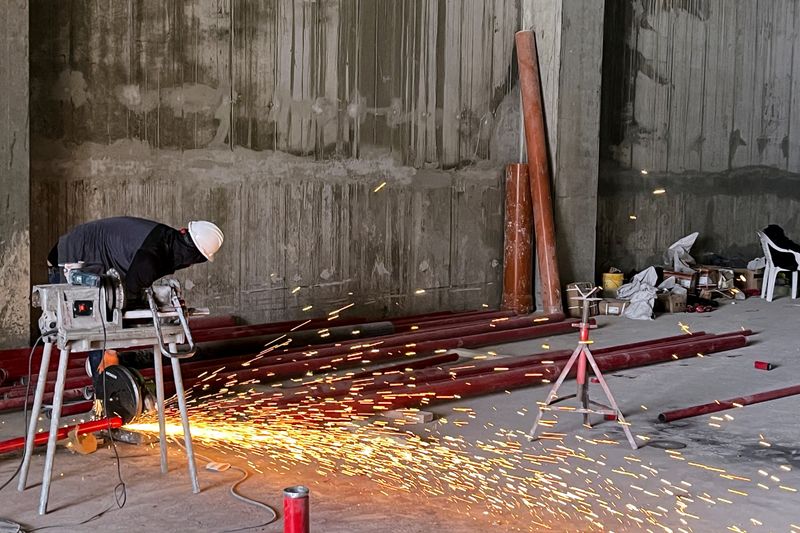JERUSALEM (Reuters) -Israeli-Turkish trade has weathered many bilateral diplomatic storms over the decades and stayed on course, reaching billions of dollars a year, but Israelis fear it may not survive the latest rift over the war in Gaza.
Turkey this month halted all bilateral trade with Israel until the war ends and aid can flow unhindered into Gaza. Israel said Turkey’s move violated World Trade Organization rules.
Israeli importers have scrambled to find alternative sources of key items ranging from cement to food and cars in response to Turkey’s decision, which economists say may lead to near-term shortages but is unlikely to dent Israel’s $500 billion economy.
“Turkey is a significant trade partner of Israel but we do not rely exclusively, or even remotely exclusively, on Turkey,” said Shmuel Abramzon, chief economist at Israel’s Finance Ministry, who now believes Israel’s 2024 economic growth will exceed his current 1.6% forecast.
“While some alternatives may introduce higher costs, we do not anticipate significant or persistent disruption to the Israeli economy by Turkey’s actions.”
Bilateral trade slid nearly 23% to $6.2 billion in 2023, Israeli government data shows, with Israeli imports accounting for around three quarters of that figure.
After Ankara’s move, several Turkish export companies told Reuters they were seeking ways of sending goods to Israel via third countries, but exporters and importers in both Turkey and Israel have since said there is no sign of this succeeding.
Trade officials say Greece, Italy and others are willing to fill the vacuum left by Turkey and that deals are close but the main problem will be finding alternative destinations for more than $1.5 billion worth of displaced Israeli exports, largely fuel, chemicals and semiconductors.
“I don’t think the economy should rely on a country that says one day ‘we want to trade with you’ and on another day ‘we don’t want to trade with you'”,” said Roey Fisher, head of the Economy Ministry’s Foreign Trade Administration.
“Trade should be reliable and sustainable … And therefore, we feel that our goal is to find reliable sources for the long term,” he told Reuters.
FROSTY TIES
Turkish President Tayyip Erdogan has been sharply critical of Israel’s military offensive in Gaza against the militant Palestinian group Hamas.
The war began on Oct. 7 when Hamas gunmen stormed into Israel, killing around 1,200 people and seizing more than 250 hostages, according to Israeli tallies. Nearly 36,000 Palestinians have been killed in Israel’s subsequent offensive, Gaza’s health ministry says.
Shortly before the war erupted, Erdogan and Israeli Prime Minister Benjamin Netanyahu had met in person, amid a slow improvement in ties long strained by the Palestinian issue. But their plans to visit each other’s country were then shelved.
Turkey recalled its ambassador to Israel in November for consultations and flights between the two countries have been suspended. Erdogan has called Hamas a “liberation movement” and hosted its chief, Ismail Haniyeh, in Istanbul last month.
In retaliation for the trade ban, Israeli Finance Minister Bezalel Smotrich said he would scrap the free trade agreement with Turkey – at least until Erdogan steps down and is replaced by “a leader who is sane and not a hater of Israel”. The plan, he said, would be submitted to cabinet for approval.
Turkey is the first – and so far the only – major trade partner of Israel to suspend trade over the Gaza war. Turkey ranks as Israel’s fifth biggest trade partner but still accounts for less than 5% of its total imports.
‘NOT A CATASTROPHE’
However, Turkey has accounted for some 40% of Israel’s imported cement, said Shay Pauzner, deputy director general of the Israel Builders Association.
While the industry has turned to European suppliers, he said, “it will be much more expensive than from Turkey”, which is known for cheap industrial products.
“It’s a problem, not a catastrophe,” he added.
Meanwhile, two of Israel’s main auto importers said certain models of Toyota (NYSE:TM) and Hyundai (OTC:HYMTF) cars were stuck at Turkish ports due to the trade ban.
Union Motors, Israel’s Toyota importer, said the ban had impacted the delivery of Corolla and C-HR models and that it was seeking solutions.
Colmobil, which imports Hyundai autos from Turkey, said it was suspending orders for some models and working with the manufacturer on supply solutions.
Similarly, Diplomat – one of the largest importers in Israel – said it was trying to find alternatives to Turkey to bring in a range of consumer products, including brands from Heinz, Gillette, Braun and Pampers.

Israeli officials say they plan to increase local production to avert shortages. An Israeli Manufacturers’ Association survey last week found that 80% of manufacturers had alternatives to Turkey, while 60% said they had a three-month inventory.
“Although we have become addicted to the cheap imports from Turkey … it is possible to get by fine without it,” said association president Ron Tomer. “As a country, we must reduce as much as possible the dependence on hostile countries and strengthen our productive independence.”
To read the full article, Click Here

